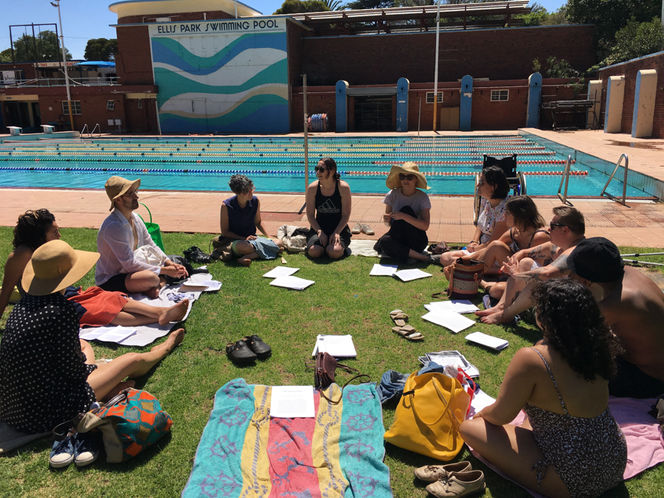Reading cycle | Sinethemba Twalo and Abri de Swardt: 'To See with the Ears and Speak with the Nose'
7 November - 4 December 2019
POOL, Ellis House, Johannesburg
Beginning from Amal Donqul’s statement that the sea like the desert does not quench thirst, READING CYCLE #1 invites participants to explore questions of entanglement, chaos, desire, contradiction within everyday life and the imminent unknown. The cycle traces the echogenic qualities of water, its reverberating hums, its fluidity and constant movement back and forth, which impel a becoming (other)wise.
Through a performativity of textual immersion in which boundaries between literary and theoretical genres become porous, and dissipate against and within each other, the cycle enunciates wetness as a conduit for the affective capacities of words. The title points to the sensorium of cetaceans, suggesting a trans-position and embalming of our own orientations to embrace hydromechanics as a gesture of (dis)solution, a streaming of bodies, and a pooling of temporalities.
This use of ‘temporal’ touches upon the use of temps in French for both time and weather, heeding us that we should think of time, citing Michel Serres, as aleatory mixtures of the temperaments, of intemperate weather, of tempests and temperature which percolates rather than flows. Time is thus approached as historically thermodynamic. In aligning the sessions with the quarter moons a tidal attenuation and equilibrium is approached outside of chrononormativity. Cast beneath the waters, one crosses over into an aesthetics of drowning.
To See with the Ears and Speak with the Nose forms part of Holding Water - a programme of workshops, reading groups, film screenings and artist presentations that think the oceanic from land-locked Johannesburg, commissioned by POOL and the Oceanic Humanities for the Global South, WiSER, Wits University.
For more details, please visit: https://www.pool.org.za/#
Beginning from Amal Donqul’s statement that the sea like the desert does not quench thirst, READING CYCLE #1 invites participants to explore questions of entanglement, chaos, desire, contradiction within everyday life and the imminent unknown. The cycle traces the echogenic qualities of water, its reverberating hums, its fluidity and constant movement back and forth, which impel a becoming (other)wise.
Through a performativity of textual immersion in which boundaries between literary and theoretical genres become porous, and dissipate against and within each other, the cycle enunciates wetness as a conduit for the affective capacities of words. The title points to the sensorium of cetaceans, suggesting a trans-position and embalming of our own orientations to embrace hydromechanics as a gesture of (dis)solution, a streaming of bodies, and a pooling of temporalities.
This use of ‘temporal’ touches upon the use of temps in French for both time and weather, heeding us that we should think of time, citing Michel Serres, as aleatory mixtures of the temperaments, of intemperate weather, of tempests and temperature which percolates rather than flows. Time is thus approached as historically thermodynamic. In aligning the sessions with the quarter moons a tidal attenuation and equilibrium is approached outside of chrononormativity. Cast beneath the waters, one crosses over into an aesthetics of drowning.
To See with the Ears and Speak with the Nose forms part of Holding Water - a programme of workshops, reading groups, film screenings and artist presentations that think the oceanic from land-locked Johannesburg, commissioned by POOL and the Oceanic Humanities for the Global South, WiSER, Wits University.
For more details, please visit: https://www.pool.org.za/#



